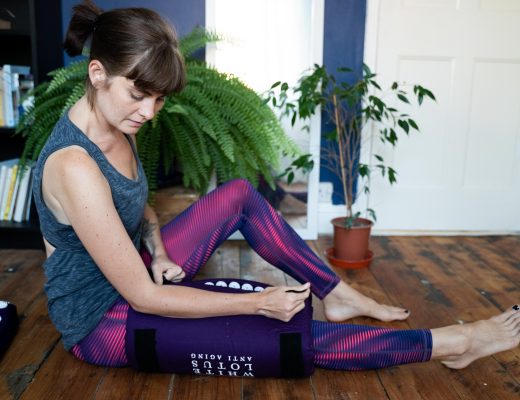Now that the weather is going to be on the turn to the chilly and nights will soon be spent bundled up on the sofa, I wanted to share a list of documentaries that can help get you through the winter.
There’s nothing better than a good mindless veg out session on Netflix, but some days you just want to watch something that inspires a bit of thought, right?
Here’s my list of documentaries available on Netflix that will inspire you to make some small changes, fire up your creativity and motivate you.
Minimalism: A Documentary About the Important Things
This documentary comes at you from the team that runs the website “The Minimalists”. The good? It raises some really interesting points about over-consumption and allowing ourselves to be bogged down with too much stuff. (My criticism of the film would be that a lot of their interviews, etc come from people in a position of privilege where living with less but better is more attainable.)
What the Health
When this came out, it caused quite the social media buzz. Can being vegan cure all your ailments? The good: it’s a thought provoking documentary about the links between diet and disease. The bad: it demonises certain foods and overstates and misrepresents some of the things we do know about diet and disease.
The True Cost
This documentary explores the global cost of fast-fashion and asks the all important question of, if I’m paying £3 for this shirt, how much is the person making it getting paid? The documentary juxtaposes product and process. If there is one film on this list that made a direct impact on my life, it would be this one as it has made a real impact on my shopping habits. Cheap fashion might be great for our wallets, but it’s terrible for humanity in general.
Vegeducated
Another documentary about people trying veganism. This one has some similar pseudo-science similar to “What the Health” but what I find is fascinating and watchable about it is seeing what and where the subjects struggled with in changing the diet. (Social eating with friends, etc).
Small is Beautiful
A documentary about people who are building their own and living in tiny houses. It’s fairly light viewing and I am fascinated my tiny homes. I’m not sure that I could live in one, but I’d like to think that I could. They very much appeal to my obsessive organiser soul.
11th Hour
The Leonardo DiCaprio produced and narrated documentary about global warming draws together some of the world’s greatest scientists, politicians and environmental activists to discuss global warming, deforestation and mass extinction. I found that it jumps around a bit (somewhat to the documentary’s detriment) but overall paints a picture of hope if we all act.
Hungry for Change
Again there was some food demonisation that I just can’t get on board with (in this case sugar). However, it made some really interesting points about dieting that need to be hammered home: that the dieting paradigm is flawed because diets are only temporary; and that the best “diet” strategy is to add-in the “good” stuff (e.g. veg). Your daily diet shouldn’t be about deprivation.
The Hunting Ground
This documentary comes with a massive trigger warning as it is about university college campuses in America and the sexual assault epidemic. The documentary focuses on Annie E. Clark and Andrea Pino, two former University of North Carolina at Chapel Hill students who filed a Title IX complaint against UNC in response to their rapes while enrolled. The use of Title IX in campus sexual assault cases became a model for universities across the country.
There have been critiques of the film that focus on the fact that many of the anonymously accused in the film were found “not guilty”. Which really only seems to prove the documentary’s point.
Moreover, attempts to undermine the film only prove its point that institutions favor accused perpetrators. A cabal of Harvard Law School professors recently published a statement defending (and naming) one of their students, who was (anonymously) accused of sexual assault in the film. The letter emphasized that he was not responsible for the women’s inebriation, nor was he a repeat offender. (Congratulations?) “There was never any evidence that Mr. Winston used force,” they write, “nor were there even any charges that he used force.” They neglect to mention that force would have never been necessary, because the women were unconscious when Mr. Winston began to assault them, rendering a “forceful” response impossible.
Huffington Post
Dirty Money
Dirty Money isn’t a single documentary, but a Netflix created season of several shorter documentaries.
The first is “Hard NOx” about how Volkswagen cheated emissions standards through blatantly rigged tests and was ultimately fined billions for their crimes.
The second is “Payday” which focuses on how people have been made rich by running payday loans companies at the expense of desperate Americans. (It follows the story of Scott Tucker who funded his Level 5 racing program partly through deceptive, undisclosed payday-loan fees.)
The third is “Drug Short“, which is probably one of the most rage-inducing stories told in the series. It focuses on how large pharmaceutical companies in the United States raise the prices of life-saving drugs to astronomical levels and how people “short sell” in order to get rich. If there’s only one piece that you’re going to watch in the series, it should be this one.
The fourth is “Cartel Bank” which follows the trail of transactions that link HSBC to absolutely horrendous crimes around the world. As someone who banks with HSBC it left me absolutely appalled and became a major factor in why I will be switching banks as soon as my UK immigration journey is over.
The fifth is “The Maple Syrup Heist” which is the most light-hearted of the bunch in terms of subject matter, but explores the real pain of independent syrup sellers in Canada that are struggling due to the prices regulatory bodies have set.
The sixth is “The Confidence Man” which explores who Donald Trump has branded himself as a self-made billionaire despite relying on his father’s money to get him through various high-profile failings.
Cowspiracy
More than just a film that promotes a plant-based diet, Cowspiracy investigates the meat and dairy industries’ impact on the environment. Criticism of the film mainly revolves around the fact that other scientists think that livestock only accounts for 15% of the global greenhouse gas emissions, though the documentary claims that they are responsible for more than that. (Though I would argue that 15% is still quite a lot.)
Miss Representation
The film’s tagline is “You can’t be what you can’t see” and it explores the fact that young women want and need positive role models and that the media has neglected to provide them; usually offering only limited or disparaging views of women instead. I completely agree with the criticism of the narrow roles for women that literature, theatre, film, tv and other media provide; however, my biggest criticism of this documentary is where is the intersectionality? It mostly focused on how the issue impacts straight, white women.
Food Inc
Food Inc examines corporate farming (meat, dairy, vegetables and grains) and how it is environmentally damaging as well as damaging to employees and small businesses. It’s a really interesting watch to anyone interested in sustainability.
Tiny (A Story About Living Small)
Another documentary about tiny homes, because as I mentioned earlier, I am fascinated by them. It definitely made me think about the power of my relationship with things.
Happy
The concept of “being happy” can be such an abstract one, and this documentary explores that. It brings together a wealth of scientific, empirical, and national research on happiness and leaves it bubbling away in the background of your brain as a resource.
Do you have any other documentaries that you think I should add to my list?




